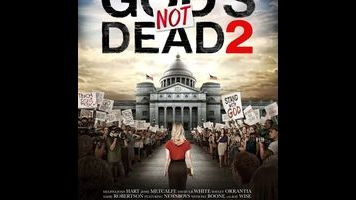The opening helicopter shots (though perhaps just stock footage) indicate we’re operating at a realm of higher budget and competence than the baldly cheap, badly assembled first film. There are some inexplicable shot choices—a pull-back from a huge close-up of a stapler on a classroom desk is a howler—but it’s a more smoothly made product, the narrative wheels greased by old pros Wise (who acts like he’s still possessed by Twin Peaks’ Bob) and Ernie Hudson as the presiding judge, both significant upgrades from Kevin Sorbo and Dean Cain, to be sure.
The first film pandered to a heavy persecution complex; this installment’s relatively subtler, but there are dog whistles aplenty. When the school board is unwilling to directly punish Grace, a board member wonders, “How do we make this go away without getting blood on our hands?” The public school system and those pesky teachers’ unions are Pontius Pilate, while the ACLU are the Roman soldiers prepping for another round of martyrdom. Kane approaches the parents of the student who asked the question prompting Grace’s answer, luring them with the promise that being at the center of a division of church and state case would make her very attractive to Ivy League schools, a reminder that elitist higher education inculcates godlessness. (The parents sign their deal with Kane with a symbolically blood-red pen no less.) On TV, a seething liberal pundit says “the religious extremists we really need to worry about are the hardcore Christians,” cueing audiences to indulge their Islamophobic tendencies (possibly by remembering the Muslim father in the first film who kicks his daughter out after he finds her listening to Franklin Graham). “Diversity and tolerance” are mockingly invoked as tools to suppress Christians, and the culture wars extend to the courtroom’s jury selection process. With each side having veto power, they ask what each prospective viewer’s favorite TV show is; the godless veto Duck Dynasty viewers, the godly nix Pretty Little Liars fans. There are also several very unsubtle plugs for Prius, a reminder that movies are business propositions, some more cynical than others.
The main goal is still stoking a sense of paranoia. When Grace speaks of “escalating persecution” against Jesus and MLK, the audience is supposed to feel persecuted themselves. A subplot about churches having their sermons subpoenaed—one attempt was made in Houston by an overreaching official and quickly shut down—prompts speeches about the federal government cracking down on belief that are one step away from rambling about FEMA concentration camps. Grace’s (atheist) lawyer Tom Endler (Jesse Metcalfe) constructs his argument as a slippery slope: First he argues Grace was merely delivering historical facts, then he trots out some (real, best-selling) Christian apologists to make the historically irrefutable case for Jesus. By film’s end, he’s basically saying if you can’t talk about Jesus in the schools, then the never-ending persecution of Christians will continue.
As the Newsboys’ song “Guilty” declaims at the end, “When did it become breaking a rule to say your name out loud in school?” That’s a gross exaggeration, and the film shoots itself in the foot by constructing a case bearing no potential resemblance to reality. There are certainly places where communities indulge in school prayer because it’s the norm, so it’s hard to imagine that an Arkansas school district would get this freaked out about a secular exchange. The climactic showdown—children of faith on the courthouse steps being yelled at by a horde of angry atheists—is parallel universe fiction. In any case, the movie’s thesis line isn’t one of its many scriptural citations or exhortations to faith, but a line among pastors discussing the possibility of a federal crackdown: “Don’t forget the silent majority.” From its lecture on the conservative canard that separation of church and state is a myth on down, God’s Not Dead 2 is a movie for Ralph Reed’s Moral Majority, with all the entangled political baggage that comes with it.









































